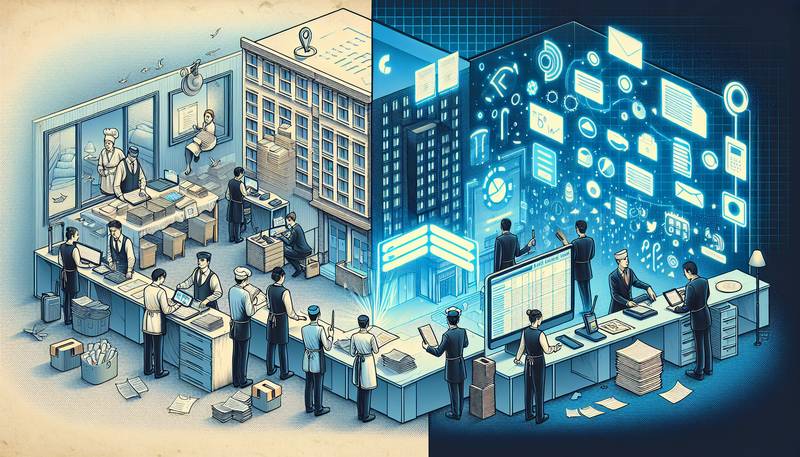Hotel Industry's Digital Transition: From QC Defense to Offense

The Shift from Manual to DigitalOnce upon a time in the realm of hospitality, quality control (QC) was as thrilling as watching paint dry. The process involved stacks of paper, pen-wielding inspectors, and enough checklists to rival a NASA launch sequence. Even the spreadsheets seemed to sigh at the thought of endless manual entries. Fast forward to today, and the whole scene has transformed into something resembling a sci-fi movie—minus the flying cars and, thankfully, the spacesuits.The introduction of digital solutions has breathed new life into the QC process. It's like adding espresso to decaf coffee—suddenly, things are buzzing with energy! Automated systems now handle data meticulously, giving hotel managers the ability to focus on what truly matters: making sure your room doesn't look like a scene from a horror movie.The Best Tools for the JobAdopting digital solutions is like trading in your trusty old bicycle for a sleek electric scooter. There are several nifty tools available to streamline the QC process and enhance guest satisfaction. A few of the standouts include: - Cloud-Based Management Systems: These platforms allow managers to access real-time data from anywhere—yes, even from the beach while sipping a piña colada.
- Mobile Inspection Apps: Conducting audits on the go? Yes, please! These apps let staff document issues promptly, ensuring that no toilet paper roll goes unexamined.
- Customer Feedback Tools: Gathering guest reviews has never been easier, helping hotels stay ahead of any potential issues. Just imagine a world where every complaint is addressed before the guest even checks out—like magic!
With these tools, hoteliers can shift from a reactive to a proactive approach. Gone are the days of “We didn’t know the air conditioning was broken until the guests told us.” Instead, they’re now spotting issues before the Wi-Fi signal drops!Enhancing Guest ExperienceQuality control isn't just about preserving the hotel's immaculate reputation—it's also about creating memorable experiences for guests. When hotel staff are equipped with the right information, they can anticipate needs better than a seasoned psychic at a county fair.Imagine checking into a hotel where the staff knows your favorite pillow type. This isn’t just a plot twist from a rom-com; it’s achievable through effective use of digital tools. Predictive analytics can analyze previous guest behaviors and tailor services accordingly. Now that’s the stuff of dreams… or at least satisfying hotel stays.Furthermore, streamlined communication between departments means that maintenance staff can jump on issues faster than a cat on a laser pointer. If a guest reports a leaky faucet, the front desk can inform maintenance before the guest has a chance to complete their in-room yoga session. Data-Driven DecisionsIn a world where data reigns supreme, hotels must adapt to make decisions based on factual insights rather than gut feelings. Embracing analytics allows hotel management to identify trends, forecast demand, and allocate resources with the precision of a master chef slicing onions—without the tears.For instance, if data reveals that a hotel sees a surge in bookings during a specific local event, management can prepare staff schedules accordingly and even promote special packages. No one wants to host guests while accidentally trying to figure out how many muffins to bake for breakfast at the same time!Team Dynamics and TrainingAs technology infiltrates hotel operations, investing in team training becomes crucial. After all, even the fanciest tools are about as useful as a chocolate teapot if the team is still trying to figure out how to turn them on.Training staff on new systems not only helps them feel empowered but also fosters a culture of accountability. The more capable they feel, the better they perform. Picture a staff member who can resolve a guest's issue faster than you can say, 'Where's my room service?' Moreover, blending technology with human touch creates a harmonious balance. Guests still cherish personal interactions—no one wants to be greeted by a robot that sounds like it’s taken one too many caffeine pills.Catching the Wave of ChangeAs the hotel industry rides the digital wave, embracing technology in QC practices is essential for long-term success. Adapting to this change allows hotels to not only survive but thrive amidst growing competition and evolving guest expectations. Considering the effort that goes into ensuring guest satisfaction, it’s clear that hotels need to stay one step ahead—kind of like a waiter expertly balancing five plates while also remembering who ordered what, with a smile that says, 'This is all in a day’s work.When it comes to modern hospitality, staying on top of quality control may not just be a necessity. It might also turn out to be an exhilarating ride—far more interesting than a checklist on a clipboard, and certainly a lot less likely to give anyone a paper cut!
|
|







